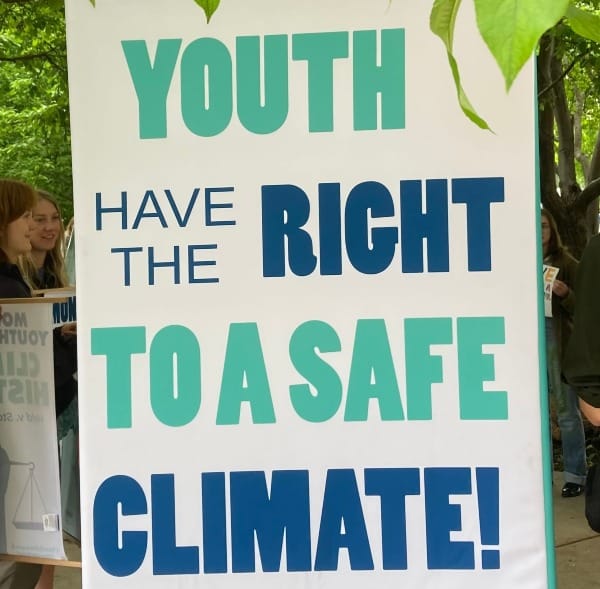Minnesota Attorney General Sues Exxon, Koch And API For Climate Deception

Story originally published by DeSmog
Minnesota has officially joined the climate accountability movement with the announcement on Wednesday, June 24 of a groundbreaking lawsuit against fossil fuel behemoths such as ExxonMobil and Koch Industries and the nation's largest oil and gas lobbying group for alleged deception on climate change.
Minnesota Attorney General Keith Ellison announced the lawsuit at a press conference Wednesday. The lawsuit names as defendants ExxonMobil, the American Petroleum Institute (API), and Koch Industries as well as Koch subsidiaries Flint Hills Resources LP and Flint Hills Resources Pine Bend. The lawsuit claims these organizations violated Minnesota consumer protection laws for orchestrating a campaign of deception around climate science and the danger of fossil fuels.
“We’re here suing these three entities specifically because they designed, conducted, and funded this campaign of deception,” Ellison said at the opening of the press conference.
That campaign of deception, he explained, included “deliberately undermining the science of climate change,” downplaying the role that fossil fuel products play in causing climate change, and failing to warn consumers and the public of what the fossil fuel industry already knew. Evidence uncovered by journalists and researchers shows that the fossil fuel industry, and specifically API, the largest trade association for U.S. oil and gas, knew since at least the 1950s about the climate impacts of burning fossil fuels.
But instead of sounding the alarm, the industry continued internally researching climate science and, starting in the late 1980s, publicly casting doubt on the science. The Minnesota complaint, for example, includes an image of print advertisements from the Information Council for the Environment, an industry front group dedicated to denying the science of climate change. The ads compare predictions of climate change to “Chicken Little” and assert that “they may not be true” — despite the defendants’ knowledge of the validity of such predictions.

“For 30 years the defendants made misleading statements about climate change, the relationship between climate change and their fossil fuel products, and the urgency of the problem. For 30 years they lied, deceived, muddled the facts, and created a false controversy when there really wasn’t one,” Ellison said during the press conference.
“With this action, Minnesota is joining a growing list of governments from around the country that are seeking to hold companies responsible for misleading the public about climate change in order to protect their bottom line,” Minnesota Asst. Attorney General Leigh Currie said.
Over a dozen lawsuits have been filed against fossil fuel companies by municipal governments including cities and counties in California, Colorado, Washington, and Hawaii, as well as the cities of Baltimore and New York and the state of Rhode Island. The state of New York filed an investor fraud lawsuit against ExxonMobil, which went to trial last fall and was dismissed. Massachusetts Attorney General Maura Healey sued Exxon on October 24, 2019, claiming both investor fraud and consumer fraud, and that case is currently proceeding.
Minnesota’s lawsuit is most similar to the Massachusetts case in the allegations of consumer fraud in violation of state consumer protection statutes. But the Minnesota lawsuit targets additional defendants besides Exxon and is the first in the country to target Koch Industries and API.
API responded to the Minnesota announcement by defending the petroleum industry’s environmental record.
“The record of the past two decades demonstrates that the industry has achieved its goal of providing affordable, reliable American energy to U.S. consumers while substantially reducing emissions and our environmental footprint. Any suggestion to the contrary is false,” API Chief Legal Officer and Senior Vice President Paul G. Afonso said in an emailed statement.
“This lawsuit is part of a coordinated, politically motivated campaign against energy companies. Legal proceedings like this waste millions of dollars of taxpayer money and do nothing to advance meaningful actions that reduce the risks of climate change,” Exxon spokesperson Casey Norton said in an emailed statement.
“ExxonMobil will continue to invest in efforts to reduce greenhouse gas emissions while meeting society’s growing demand for energy,” Norton added. “A Texas court recently referred this type of litigation as ‘Lawfare’ — an ugly tool that abuses the legal system to seek environmental policy change. The claims are baseless and without merit. We look forward to defending the company in court.”
Minnesota filed the lawsuit in District Court for the County of Ramsey, a Minnesota state court. The lawsuit includes claims for fraud, failure to warn, and multiple separate violations of Minnesota statutes that prohibit consumer fraud, deceptive trade practices, and false statements in advertising. In return, the state is asking Exxon and Koch Industries to turn over profits (meaning they would pay large sums of money) and is seeking maximum civil penalties (more money). Additionally, the lawsuit calls for an order requiring the defendants to stop their alleged misleading advertising and communications and to fund a public education campaign in Minnesota on the subject of climate change.
Echoes of Tobacco Litigation
Minnesota played a leading role in state attorney general lawsuits against the tobacco industry, which misled consumers about the health risks of smoking. The landmark case State of Minnesota v. Philip Morris resulted in a substantial settlement of $6 billion over the first 25 years and $200 million every year after, and was the only state case against Big Tobacco to make it to trial.
Doug Blanke, who worked on the tobacco case as former head of the Minnesota Attorney General’s Consumer Protection Division, said he believes the climate deception lawsuit has a good chance in the courts based on what happened with the tobacco litigation. He said the legal claims and alleged wrongdoing are very similar.
“The alleged actions from these [fossil fuel] defendants are ripped straight from the playbook of the tobacco industry,” Blanke said during the press conference.
Roberta Walburn, an attorney with Ciresi Conlin who also led Minnesota’s groundbreaking tobacco case, made a similar comment at an event titled “The Legal and Scientific Case for Recovering Climate Change Damages in Minnesota From Fossil Fuel Companies,” held last October at the University of Minnesota Law School.
“I think we’re seeing in the climate change litigation the fossil fuel players using the same playbook as the tobacco companies did,” Walburn said. “They’re using some of the same players, hiring a payroll of researchers to create doubt about the science, using trade groups to do the same thing.”
'Exxon Chose Profit Over People'
Minnesota Attorney General Ellison and other speakers at the press conference explained that this lawsuit is focused on holding corporate actors accountable for putting profits over people’s lives and health.
“When corporations and trade associations break the law and hurt Minnesotans, it’s my job and my duty to hold them accountable,” Ellison said.
“Unfortunately, some companies seem to care more about their bottom lines than the public’s health. But it’s a violation of Minnesota law to mislead consumers about the products you sell, and the Attorney General has laid out a powerful case that these companies did exactly that,” said Doug Blanke, who now directs the Public Health Law Center at the Mitchell Hamline School of Law.
“We are spending our time fighting a last-minute battle to preserve a livable world for ourselves and future generations because corporations like Exxon knew the impacts of climate change, but continued to deceive the public for decades,” added Juwaria Jama, an organizer and state lead for the Minnesota Youth Climate Strike. “Exxon chose profit over people. It’s time they’re held accountable.”


